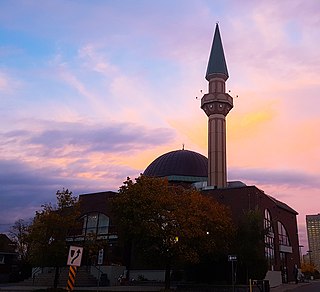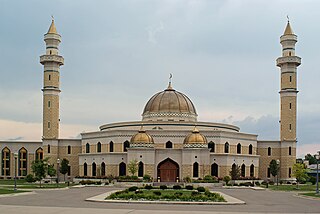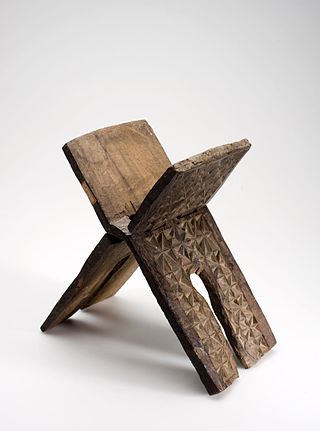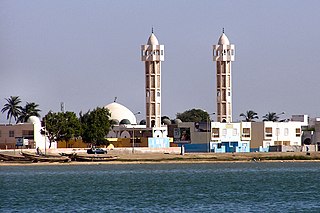
Islam in France is a minority faith. Muslims are estimated to represent around 4 to 8 percent of the nation's population and France is estimated to have the largest number of Muslims in the Western world, primarily due to migration from Maghrebi, West African, and Middle Eastern countries. After conquering much of the Iberian peninsula, the Umayyad Muslim forces invaded modern day southern France, but were decisively defeated by the Frankish Christian army led by Charles Martel at the Battle of Tours in 732 AD, thus preventing the subsequent Islamisation of the Western Europe.

Islam is a minority religion in Canada and the second largest religion in the country after Christianity. Muslims have lived in Canada since 1871 and the first mosque was established in 1938. Most Canadian Muslims are Sunni, while a significant minority are Shia and Ahmadiyya. There are a number of Islamic organizations and seminaries (madrasas). Opinion polls show most Muslims feel "very proud" to be Canadians, and majority are religious and attend mosque at least once a week. The majority of Canadian Muslims live in the provinces of Ontario and Quebec.

Islam is the 3rd largest religion in the United States, behind Christianity and Judaism. A 2017 study estimated that 3.45 million Muslims were living in the United States, about 1.1 percent of the total U.S. population. In 2017, 20 states which were mostly in the South and Midwest reported Islam being the largest non-Christian religion. In 2020, the U.S. Religion Census found there to be 4.45 million Muslims in the country, making up 1.3% of the population.

Islam is the second largest religion in the Netherlands, after Christianity, and is practised by 5% of the population according to 2018 estimates. The majority of Muslims in the Netherlands belong to the Sunni denomination. Many reside in the country's four major cities: Amsterdam, Rotterdam, The Hague and Utrecht.

Brazil is a predominantly Christian country with Islam being a minority religion, first brought by African slaves and then by Lebanese and Syrian immigrants. Due to the secular nature of Brazil's constitution, Muslims are free to proselytize and build places of worship in the country. However, Islam isn't independently included in charts and graphics representing religions in Brazil due to its very small size, being grouped in "other religions", which generally represent about 1% of the country's population. The number of Muslims in Brazil, according to the 2010 census, was 35,207 out of a population of approximately 191 million people. This corresponds to 0.018% of the Brazilian population. In addition, Brazil recognized the Middle Eastern Muslim country Palestine as an independent state on December 3, 2011.

Islam was the first Abrahamic monotheistic religion to arrive in Ghana. Today, it is the second most widely professed religion in the country behind Christianity. Its presence in Ghana dates back to the 10th century. According to the Ghana Statistical Service's Population and Housing census (2023), the percentage of Muslims in Ghana is about 35%.

Islam is the official state religion in Tunisia. According to CIA, 99.1% of its adherents are Sunni Muslims. The constitution of Tunisia states that the country's “religion is Islam”, the government is the “guardian of religion”, and requires that the president be Muslim. The predominant madhhab in the country is the Maliki school. The Tunisian island of Djerba is home to a population of Ibadi Muslims.

Islam in Greece is represented by two distinct communities; Muslims that have lived in Greece since the times of the Ottoman Empire and Muslim immigrants that began arriving in the last quarter of the 20th century, mainly in Athens and Thessaloniki. Muslims in Greece are mainly immigrants from The Middle East, other Balkan regions & North Africa.

Argentina is a predominantly Christian country, with Islam being a minority religion. Due to secular nature of the Argentine constitution, Muslims are free to proselytize and build places of worship in the country.

Barbados is an overwhelmingly Christian majority country, with Islam being a minority religion. Due to secular nature of the country's constitution, Muslims are free to proselytize and build places of worship in the country. Statistics for Islam in Barbados estimate a Muslim population of over 4000, most of whom are immigrants or descendants of immigrants from the Indian state of Gujarat. A few immigrants from Guyana, Trinidad, South Asia, and the Middle East, as well as about 200 native-born persons, constitute the rest of the growing Muslim community, representing 1.50 percent of the population Close to 90 percent of all Barbadians are of African descent (Afro-Bajans), mostly descendants of the slave labourers on the sugar plantations. The remainder of the population includes groups of Europeans (Euro-Bajans), Asians, Bajan Hindus and Muslims, and an influential Middle Eastern (Arab-Bajans) group mainly of Syrian and Lebanese descent.

Islam in Colombia is a minority religion, with most Colombians professing to Christianity. According to a 2018 study conducted Pew Research Center, the size of the Colombian Muslim population ranges from about 85,000–100,000 people out of a total population of 50.4 million. In 2011, it was estimated that Colombian Muslim community numbered just 10,000 people or. The Muslim population of Colombia has reportedly been growing, mostly due to conversion. Most Colombian Muslims are converts or Muslim immigrants from the Arab World. The majority of converts to Islam in Colombia (70%) are women.

Islam in Africa is the continent's second most widely professed faith behind Christianity. Africa was the first continent into which Islam spread from Southwest Asia, during the early 7th century CE. Almost one-third of the world's Muslim population resides in Africa. Muslims crossed current Djibouti and Somalia to seek refuge in present-day Eritrea and Ethiopia during the Hijrah to the Christian Kingdom of Aksum. Like the vast majority (90%) of Muslims in the world, most Muslims in Africa are also Sunni Muslims; the complexity of Islam in Africa is revealed in the various schools of thought, traditions, and voices in many African countries. Many African ethnicities, mostly in North, West and East Africa consider Islam their Traditional religion. The practice of Islam on the continent is not static and is constantly being reshaped by prevalent social, economic, and political conditions. Generally Islam in Africa often adapted to African cultural contexts and belief systems forming Africa's own orthodoxies.

Muslims in North Macedonia represent a third of the nation's total population according to the census of 2002, making Islam the second most widely professed religion in the country. Muslims in North Macedonia follow Sunni Islam of the Hanafi madhhab. Some northwestern and western regions of the country have Muslim majorities. A large majority of all the Muslims in the country are ethnic Albanians, with the rest being primarily Turks, Romani, Bosniaks or Torbeš.

Christianity is the most widely professed religion in the Dominican Republic. Historically, Catholicism dominated the religious practices of the country, and as the official religion of the state it receives financial support from the government. In modern times Protestant and non-Christian groups have experienced a population boom.

Islam is a minority religion within the Democratic Republic of the Congo where the large majority is affiliated to various Christian denominations and sects. It was first introduced to the Congo basin from the East African coast during the Arab slave trade in the 19th century and remains largely concentrated in parts of Eastern Congo, notably in Maniema Province. Most Congolese Muslims are Sunni and follow the Shafi‘i and Maliki school of jurisprudence (fiqh). Though estimates vary, it is generally believed that between one and 10 percent of the country's population identify as Muslim.
The Constitution provides for freedom of religion, and the Government generally respected this right in practice.
Christianity is the predominant religion in Republic of the Congo.
Of the religions in Tunisia, Islam is the most prevalent. It is estimated that approximately 99% of Tunisia's inhabitants identify themselves as Muslims.

Religion and beliefs occupy an important place in the daily life of the nation of Senegal. Many denominations of the religion of Islam are represented. Christians represents 3.3%. Other belief's are officially practiced by 0.1% of the population, particularly Serer, but members of other religions also often partake in traditional practices.
The status of religious freedom in Africa varies from country to country. States can differ based on whether or not they guarantee equal treatment under law for followers of different religions, whether they establish a state religion, the extent to which religious organizations operating within the country are policed, and the extent to which religious law is used as a basis for the country's legal code.









